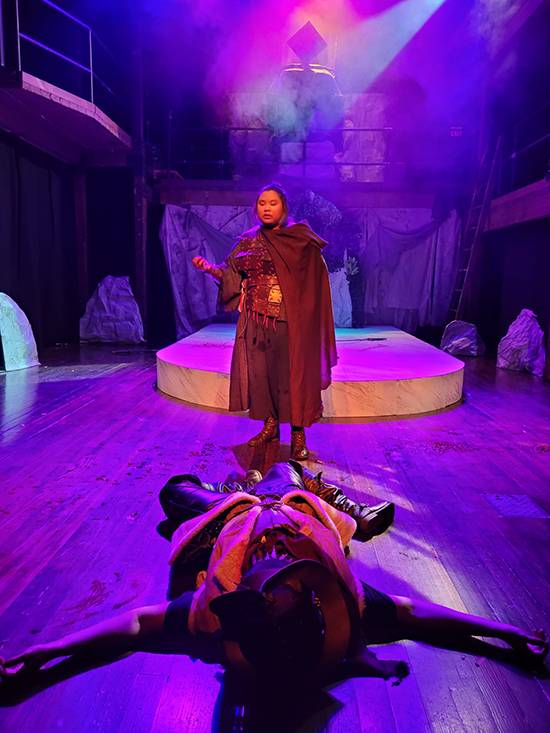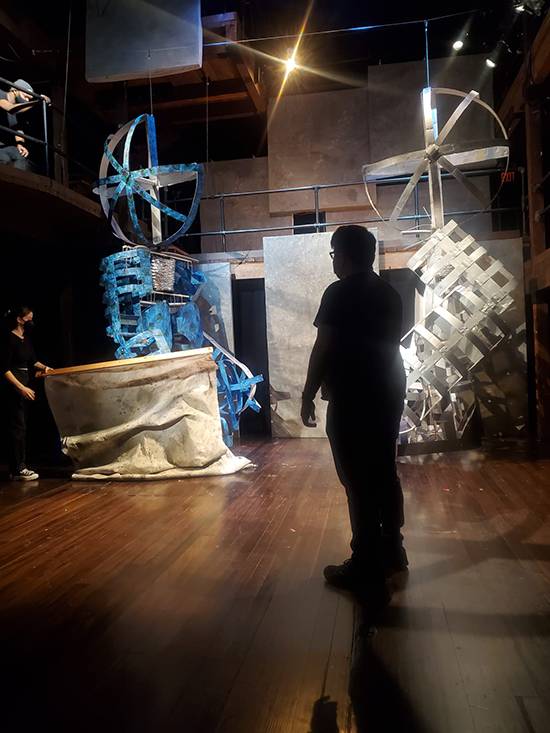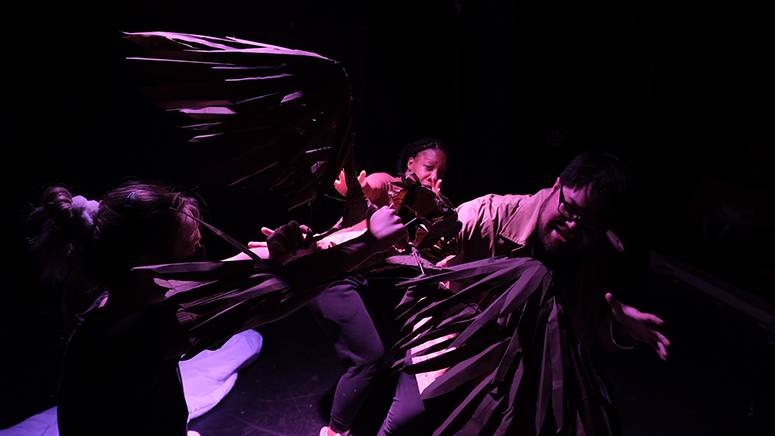This NY-based Pinoy specializes in staging ‘post-colonial space operas’
There’s displacement, and then there’s displacement that yields vivid, outsider perspectives. For playwright Kenneth Keng, raised in Manila but based in New York City after earning a theater MFA at Sarah Lawrence College, that path has led to a series of Filipino-centric plays with “Up” in the title, such as Going Up (involving giant robots), Time’s Up (featuring a giant hawk), and Wake Up (with giant swords). Prior to coming to New York, the 40-year-old Filipino-Chinese writer taught theater in Shanghai, Beijing, Hong Kong, Singapore, Amsterdam, Bogota, and Manila. His plays—which he often acts in—have been staged at New York City’s Kraine and Tank theaters. His latest play, Brought Up, is currently in development at the Performance Project, where he was selected as artist-in-residence for 2023-24.
The posters for Keng’s “Up” series riff on vintage sci-fi paperbacks from the 1970s. He describes his approach as “post-hoc world-building,” but it’s as much about resifting his memories as it is imagining a new kind of world. His visual take is so singular that stage designers for his “Up” projects have taken to calling it the “Kenneth Keng Theatrical Universe.” (He claims the “Up” theme arose only because “I’m terrible with titles.”) Nevertheless, there’s something about the Filipino-Chinese experience, growing up in “Imperial Manila,” as he calls it, and his itinerant experiences landing him in Manhattan, that draws it all together.

His first play was his MFA thesis, called AMA (for “Ask Me Anything,” a common Reddit thread), in which he dressed onstage as his Filipino lola and had the audience pitch him questions about himself-as-lola during the Japanese invasion. A background in stage comedy with the Silly People’s Improv Theater taught him to survive the toughest deadma audiences. (“I love performing improv; it’s easier to get a sense of whether the audience actually likes your work.”)

As a Filipino making his way in the New York theater scene, he’s both realistic about the struggle to find writing time (“I spend far more time writing applications for fellowships and residencies than actually writing plays”), and amazed at how supportive the theater scene can be of one another (“Extremely accomplished artists are willing to take the time to chat about opportunities, art and advancement… It feels like there is a desire for the theater community as a whole to make it together”). History—and more importantly, a kind of alternate history and speculative future—seems to drive Keng’s work. “One artistic director I worked with here once kindly described my work as ‘concerned with imagining alternate futures for the Philippines,’” he says via email. “I personally like the idea that the Philippines in some form or another will survive into the far-flung future, though people will always have to struggle to ensure that the form it takes is one that is kind.”

It leads to fertile imaginary ground. Part of it is reflecting on the migration experience and the country’s past. “I think it's important to preserve the culture of the diaspora my Filipino-Chinese family found themselves in while I explore my own feelings about being a foreigner here in the States.” At Ateneo he minored in history, but is more interested in reviewing the past through alternate perspectives—those usually left unspoken for. As he puts it, “If history didn’t matter, then governments wouldn’t expend so much effort in rewriting school textbooks.” (Note to all those currently catching a whiff of autocracy in the air.)

He’s eager to work with and acknowledge Filipinos in his projects, such as Time’s Up, which was directed by fellow Filipino playwright Guelan Varela-Luarca. But he’s hesitant to claim his plays “represent” the Filipino perspective, on Broadway or off: “I fear that by putting forward explicitly Philippine elements in my work, I’m exoticizing or tokenizing myself or my culture for an American audience.” He knows, as a Filipino-Chinese who speaks Tagalog and only “precious little Hokkien,” that he can’t represent all the experiences of all dialects on 7,000-plus islands.

And yet, the work finds its way. The next play, Brought Up, which opens in May, is described as a “post-colonial space opera.” Somehow, he half-jokes, he still manages “to shoehorn giant robots and a dance number into everything I make.” And he’s noticed something else about working in New York this length of time: “I find that the longer I’m here, the happier my endings get, with more characters surviving. I am still processing the implications of that.”


